Monday, August 15, 2005
Otakon 2005
Otakon 2005 is coming up this weekend. I'll be there with my CJAS friends, but I'll also be spending a lot of time wandering around, taking in the sights, and talking to random people. This con, after all, is part of my dissertation research.
Similarly, I will be talking to various people I have interviewed over the last year, meeting many of them in person for the first time. I still have plenty of people who I've promised to interview. If you're one of those people, and you'll be at Otakon, please let me know.
Of course, if you're a reader of lainspotting, thought experiments lain, or any of the webpages on Lawmune's Netspace, or if you know me from one of the forums I post on, let me know, because I'd enjoy meeting you.
If you want to find me but don't know what I look like, my picture is here. One place you're sure to find me is the Otakon Game Show on Saturday night. I generally sit up near the front, cheering on my friends (hopefully, they'll qualify again this year).
I'll also be attending the Evangelion panel. Other than that, I am usually scouring the dealer's room for rare stuff.
Thursday, August 11, 2005
Opera Mini's Other Name and More Opera Photos
Yesterday's post about my visit to Opera has been well-received, but the big news about Opera was the announcement of the very exciting Opera Mini, which will allow the browser to run on low- and mid-tier cell phones. I hope this service comes to the US quickly. Could it usher in a whole new cell phone culture in the US? When camera phones became affordable and part of everyday life, that was huge for the cell phone industry. Will affordable full-powered mobile browsing be the next big thing?
true mobile browsing + camera phones + millions of users = endless possibilities
Anyhow, that's not the main point of this journal entry. With all the buzz surrounding the announcement, people haven't noticed that Opera Mini also has another name (which you'll notice if you look at the download links). That name is "Operette". It might only be an internal or development code name; I really don't know. Perhaps Opera will drop that name altogether, but personally, I hope they keep it. It's a really cute name, don't you think? (Imagine a younger Opera-tan or her little sister)
More Opera Photos
I don't have more of my own photos to share, but last night I remembered that there are actually more Opera photos online, even though a lot of people might not realize it. As it turns out, several of Opera's annual reports (brochures, essentially) from previous years have actually used photos of real Opera employees in the Opera offices. PDF files of these brochures can be found on Opera's Investor Relations page, but you can also click on the images below for direct links:
2000: I don't remember their names, but I recognize some of Opera's engineers.

2001: I recognize Jakob on page 3 and Live Leer, desktop product line manager, on page 6.
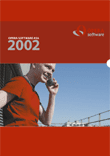
2002: The cover features Fredrik, Opera's Webmaster. That's Live again on page 3.

2003: I'm not positive about this report, but I think it uses photos of Opera employees. The cover, anyhow, looks like Jon S. von Tetzchner, Opera's CEO.
As far as I know, the 2004 report doesn't use Opera employee photos. Maybe we'll see some in the 2005 report.
Wednesday, August 10, 2005
My Visit to Opera
[Disclaimer: The opinions expressed below belong solely to the author and do not necessarily reflect the opinions of Opera Software ASA or its employees.]
Introduction
In late June, I had the pleasure and privilege of visiting the headquarters of Opera Software in Oslo, Norway. That was about a month and half ago. I've been planning to do this writeup ever since I got back home (to upstate NY), but I've been distracted by things such as my apartment flooding, lectures to present, website work for my advisor, a summer computer camp to coordinate, visiting brother-in-laws, my own dissertation research, and all the trials, tribulations, and joys of being a new father (baby Rowan is just over 3 months old now). In fact, I would have stayed longer in Norway, but Carol and I decided that being away from her and the baby for more than a week would make things unnecessarily difficult.
So what was I doing visiting Opera, anyway? First off, you should know that I use Opera, I'm a fan of the product, and I'm a fan of the company. Back in January, I wrote an article about Opera's brand image, and how it needs to improve if Opera wants to remain competitive in the desktop browser market, especially since Firefox (Opera's number one competitor as far as "alternative browsers" go) had taken off so spectacularly. As far as I'm concerned, there is no reason why Opera's market share cannot dramatically improve, provided that Opera pays careful attention to how it presents itself to potential users. Anyhow, here's a link to the article, if you're interested and haven't read it yet.
 Not too long after I published the article on my website, it started to garner some attention. First off, some Japanese Opera fans who are also artists began to create the Opera-tan character that I had mentioned as not having been done yet. That in itself was very cool, but I also received email from Rolf Assev, Opera's Executive Vice President of Product Marketing and Strategic Alliances, which was even more exciting. Apparently, with the imminent release of Opera 8, the folks at Opera Software had already been working to address many of the issues that I brought up in my article. Rolf asked me if I wanted to contribute to their ongoing discussion. As an Opera fan, I couldn't resist, so over the next several weeks, I was involved in email discussions talking about things such as whether or not users would like certain features and various ways to get people excited about the launch of Opera 8 (which happened earlier this year).
Not too long after I published the article on my website, it started to garner some attention. First off, some Japanese Opera fans who are also artists began to create the Opera-tan character that I had mentioned as not having been done yet. That in itself was very cool, but I also received email from Rolf Assev, Opera's Executive Vice President of Product Marketing and Strategic Alliances, which was even more exciting. Apparently, with the imminent release of Opera 8, the folks at Opera Software had already been working to address many of the issues that I brought up in my article. Rolf asked me if I wanted to contribute to their ongoing discussion. As an Opera fan, I couldn't resist, so over the next several weeks, I was involved in email discussions talking about things such as whether or not users would like certain features and various ways to get people excited about the launch of Opera 8 (which happened earlier this year).
An invitation to Norway
Eventually, Rolf invited me to come and visit Opera Software in Oslo for a week in mid-June. I jumped at the opportunity, and I'm very glad that I did so. I spent the week working with the Desktop Group and Communications and PR department. I was able to meet various Opera employees working on different projects, and I had conversations with them about a variety of topics, including (but not limited to) how to improve peoples' perception of Opera, and how to build the Opera community. I should note straight away that I'm not a highly technical person. I am interested in technology and its role in society, I use computers and other devices heavily, and I even read Slashdot on a daily (hourly?) basis, but I'm not a computer programmer, or any other form of engineer. I earned my Masters degree in biology in 2000, but these days I'm doing my dissertation in the field of Science and Technology Studies. I'm focusing on otaku culture, or extreme fan cultures, and I'm interested in their use of technology and the way that their subculture is similar to scientific culture.
Opera is a program used all over the world, but Opera Software is nestled away in Oslo, Norway. For that reason, it has been a challenge for the company to gauge the way that internet users in different countries perceive Opera, and to promote Opera in a way that speaks effectively to all of them. The folks at Opera Software were very welcoming and interested in my perspective--coming from the United States, being an Opera fan, and knowing a thing or two about fan cultures and their relationships with technology. I don't know if my feedback was incredibly useful, but at the very least, I learned a lot of interesting stuff about Opera Software during my trip, and I hope I can share some of that here.
Getting to Oslo and Opera
I flew into Oslo on a Monday morning. The only other time I had been to Europe was for my honeymoon in England, three years ago, so this was definitely an adventure for me. I took the airport train to the Oslo Central Station and got in a cab. Most people in Norway know how to speak English, it seems, so it was very easy to communicate and not too difficult to get around. Things are very expensive in Norway, and the taxi ride was my first taste of that, but that didn't concern me much. I was too busy taking in the city, which was quite beautiful, with excellent summer weather.
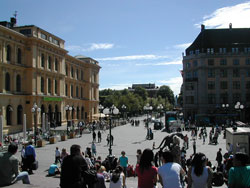
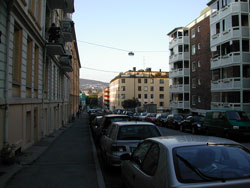
I eventually arrived at the address I was given, and I stepped out of the cab in front of a non-descript grey building. I made my way up to the fifth floor where I saw the familiar Opera logo and a red door. Upon entering the Opera offices, I was greeted by the receptionist who helped me with my accommodations and introduced me to the people I would be working with.

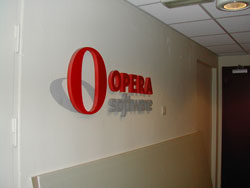
I don't have any experience working in corporate offices, so it was all new to me, but I was excited to be there. After all, this was where Opera was made. I really do love the program--I download and use the beta versions and previews, I read the Opera forums and blogs daily, I even watch the quarterly reports. Needless to say, I felt privileged just to be standing in the reception area.
The Opera Offices
When I got to Opera Software, I was a little surprised at how hidden away it was. Unless you knew about the offices ahead of time, you would never know they were there. Even when you're inside, the reception area is small, but deceptively so, as the offices are spread out quite impressively on multiple floors.


Everything radiates outward from the central hub that is the reception area. There are various doors, corridors, and stairways all leading to different parts of the building where different offices are located. As Opera Software has been growing and hiring more employees, the offices have steadily been growing outwards in a seemingly organic fashion. Luckily, I had people showing me around, so I didn't get lost in the mazelike corridors. The workspaces and conference rooms were quite nice, with lots of glass windows so people didn't feel too separated from each other, and plenty of communal areas. Everywhere I turned, people were working hard, but the atmosphere was friendly and casual. I'm not even sure if there was a dress code. Plenty of people were wearing jeans and t-shirts.
The cantina was especially nice, providing tasty meals daily, along with coffee and fruit juices. (There's a soda machine, too). On nice days, you can step outside of the cantina and eat lunch on the terrace. I've eaten quite a bit of cafeteria food in my day, and I was duly impressed by the quality of food at Opera.

The People of Opera
More important than the offices, however, are the people of Opera. They come from all over the world, so the company is very international in flavor, which is something I'm used to since I'm a graduate of Seoul International School. I felt very welcome and comfortable the entire time. Even though I voiced some candid criticisms, everyone I talked to was willing to listen. I also listened intently, learning about the company from the people who built it. Overall, I found it to be a smart, open, and warm environment. I didn't spend a lot of time with the software engineers, but the ones I met were also very open and happy to talk about their work. I even got to meet the very famous QA and customer support staff, including Haavard who is very well known on the my.opera.com forums. Haavard is an Opera celebrity of sorts, but having met other Opera employees, I think more of them should make themselves known to the public.
Here are some photos of Opera employees that I met and befriended. Some of them post messages on the my.opera.com forums, so some of these names might be familiar.
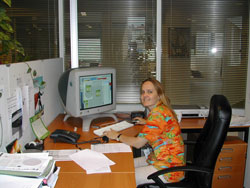
Janne wanted me to mention that the bright shirt was specifically for the Hawaiian-themed party later that afternoon (see below). Janne is one of Opera's web developers.
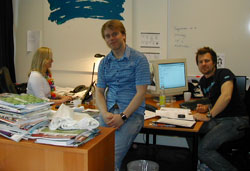
Berit, Tor, and Eskil. Tor is the communications director, Berit is a public relations specialist, and Eskil is a public relations manager. Eskil was the guy who paddled alongside Jon von Tetzchner during his failed transatlantic swim. On his website, Eskil has a hilarious video of himself on Leno.

Eivind is a web developer. A Renaissance man if I ever met one, Eivind is a super nice guy who showed me around Oslo after work. I also owe him dinner if he ever visits New York.

Nuno, Monika, and Jakob of the Desktop Group. Jakob, Opera employee number 33 and the Director of Desktop Sales and Distribution, reminded me of George Clooney.
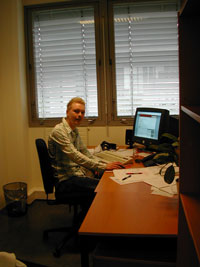
Fred (short for Fredrik) is one of the masterminds behind the Opera website. He's also working on the new community site (see below). Apparently, he's so knowledgeable and useful that people kept coming to him with questions and he couldn't get any work done, so management put him in his own cave of an office. (Every once in awhile, he comes out to eat.) Seriously though, Fred is super friendly, crazy-talented, and really excited about the community he's helping to build. He also has great stories about all the email he gets from people who think that opera.com is Oprah Winfey's website. Yes, a polite form letter is used to respond to those emails.
Unfortunately, during my visit, there was a big multi-day board meeting going on, so I didn't have a chance to meet Jon S. von Tetzchner, the CEO of Opera. He briefly interrupted a meeting I was in, so at least I saw him even if I didn't talk to him. Maybe next time...
Opera Software is not a large company (around 250 employees), but it has been growing quickly. Even though new faces are showing up all the time, people at Opera seem to genuinely like each other. Every Friday afternoon, employees get together in the cantina for drinks, but every once in awhile, a full-fledged party is held. I was lucky to be around for the Hawaiian-themed party, complete with surfboard, inflatable palm trees, karaoke on PS2 (using the European game "Singstar"), and plenty of food and drink. A fun time was had by all.

Party in the cantina. Nuno really knows how to have a good time.

Jakob and Carsten, the Desktop Group managers, chilling on the terrace. Carsten is the VP of Desktop Products. Before coming to Norway, he worked for SuSE Linux in Germany.
Opera projects
Since I signed a non-disclosure agreement, I can't really talk about most of the projects that I learned about during my visit, but one good thing about my writing this a month-and-a-half later is that some of the things I had to keep quiet about are now out in the open, so I can finally talk about them. For example, one thing I discussed with the people at Opera was whether or not Bittorrent should be included in the next version of the browser. Preview versions of Opera 8.10 now include Bittorrent, which is exciting, and the inclusion of Bittorrent seems to have been well-received. Also, I got an advance look at the boxed version of Opera now being sold at retail stores in the US (as of a few days ago).
When something new comes out at Opera, it's really exciting. I got to witness the launch of the Japanese version of Opera 8, and also Opera 8 for Mac. The crazy thing is that so many new things are always in the works. At the very first meeting I attended, new Opera features and services that I couldn't even have imagined were being planned and discussed. Opera is already known as an innovative company, but to see all the various projects in the works was amazing. If you think Opera has done a lot already, wait till you see what comes next. One thing they are working on that has been mentioned lately is a major update of the rendering engine, which is a big deal since the engine is ultimately what makes Opera so powerful, especially across multiple platforms. Also, a new Opera community site is being built, which will eventually replace the clunky vBulletin system currently in place. Fred showed me the community site in progress, and I have to say that it looks incredible, so much better than the existing community site. Fred is planning things for the community that I've never seen before, and I've been part of a lot of internet communities. Big things appear to be in store for Opera in the coming months, so keep your eyes open.
New insights
Even before my trip, I had some idea of what the company was about, but I learned so much more just from my weeklong visit. For example, even though the desktop browser is the one we tend to hear about the most, Opera Software is highly committed to making Opera work well on other devices too, which includes mobile phones (of course), but also home media devices. I already knew Opera Software developed its browser to be cross-platform, but I didn't realize just how important that is for the company and how it plays into their browser development in general.
For example, it's possible to use voice commands in the desktop version of Opera, but I'm not sure if most desktop users find that to be such a killer feature. On the other hand, when you consider Opera on mobile phones or on DVR-type devices, voice control makes a lot of sense, so now it's easier to understand why Opera is spending time on that.
 Many users, myself included, complain that Opera doesn't work on some websites, such as certain banking websites. This is a big deal, but one that can be solved in more than one way. If Opera Software wanted to, it could (without too much difficuly) code workarounds to better display non-standards compliant webpages, but that's a messy and inelegant solution. Why does that matter? Opera's small size is an important selling point for its mobile browser, and coding workarounds for specific sites could compromise that. Instead, Opera Software is trying to convince web designers to follow web standards more closely. If mobile browsing is ever going to come of age, web standards compliance will have to become a huge priority, not just for Opera's sake, but for anyone else who is developing web browsers for mobile devices. Opera works closely with the W3C and also the WHAT working group which consists of various web browser manufacturers all working together to develop new, standards-compliant, web technologies.
Many users, myself included, complain that Opera doesn't work on some websites, such as certain banking websites. This is a big deal, but one that can be solved in more than one way. If Opera Software wanted to, it could (without too much difficuly) code workarounds to better display non-standards compliant webpages, but that's a messy and inelegant solution. Why does that matter? Opera's small size is an important selling point for its mobile browser, and coding workarounds for specific sites could compromise that. Instead, Opera Software is trying to convince web designers to follow web standards more closely. If mobile browsing is ever going to come of age, web standards compliance will have to become a huge priority, not just for Opera's sake, but for anyone else who is developing web browsers for mobile devices. Opera works closely with the W3C and also the WHAT working group which consists of various web browser manufacturers all working together to develop new, standards-compliant, web technologies.
I also learned that Opera employees really appreciate Opera fans. Sometimes, in the housekeeping that has to be done on the forums (keeping threads from going overboard, for example), that's not always evident, but it's true. Also, the employees are so busy, it's not always easy for them to find time to interact with Opera fans. Nonetheless, they definitely keep track of the fan sites, forum posts, and other forms of fan creativity. Opera-tan, for example, definitely has fans within the company. Hopefully, when the new community site debuts, Opera employees will have more direct interaction with Opera users.
Speaking of Opera-tan, I met and had a very stimulating conversation with Tatsuki, the business development manager for Opera in Japan. He told me about the hardcore Opera fans in that country, and how dedicated they are to Opera (not just the software, but the company, too). Once, Jon von Tetzchner made a visit to Japan to meet with Opera fans there, and to his surprise, a lot of them wanted his autograph, so they started an impromptu session (signing t-shirts and whatnot). I guess that the high concentration of Opera fans in Japan makes it easier for those kinds of events to happen, but it'd be great to see similar events here in the U.S.
Something about Opera makes it especially appealing to internet users in Japan. Opera is doing pretty well there, and Firefox hasn't taken off in Japan like it has in other countries. Perhaps it has something to do with Japan's mobile phone culture and Opera's success on that front paving the way for success on the desktop.
Final thoughts
I thoroughly enjoyed my time at Opera Software. The people are great and they really love the product they're working on. They also have a unique sense of humor, which can be seen in the way they promote Opera, such as the silly superman guy (who is not an official mascot; he's a temporary character, part of the Opera 8 launch), Jon von Tetzchner's swim, and recently, leaked screenshots from the new community site. Even though they make a really cool product, they don't take themselves overly seriously. Behind all the levity, however, they are really smart people who care deeply about making the internet experience better for everyone.
I'd like to offer my heartiest thanks to Rolf and Opera Software for inviting me to visit and flying me out to Norway, which is a beautiful country that I'd love to visit again. Thanks to everyone who made me feel at home, and to the guys in the Opera apartment who let me stay with them. Till we meet again...
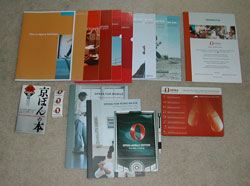
Being the collector that I am, I couldn't resist getting some Opera promo goods while I was in Norway. This is what I brought home: A set of Opera brochures and annual reports from 2000-2004, Opera's Prospectus, a mousepad with instructions on how to use common mouse gestures, brochures for Opera for Mobile and Home Media, a Japanese book about the Kyocera AirH" Phone AH-K3001V (which features Opera), Opera stickers, and an Opera pen.
(The Opera-tan image is by temp_h, and is licensed under a Creative Commons License)
Introduction
In late June, I had the pleasure and privilege of visiting the headquarters of Opera Software in Oslo, Norway. That was about a month and half ago. I've been planning to do this writeup ever since I got back home (to upstate NY), but I've been distracted by things such as my apartment flooding, lectures to present, website work for my advisor, a summer computer camp to coordinate, visiting brother-in-laws, my own dissertation research, and all the trials, tribulations, and joys of being a new father (baby Rowan is just over 3 months old now). In fact, I would have stayed longer in Norway, but Carol and I decided that being away from her and the baby for more than a week would make things unnecessarily difficult.
So what was I doing visiting Opera, anyway? First off, you should know that I use Opera, I'm a fan of the product, and I'm a fan of the company. Back in January, I wrote an article about Opera's brand image, and how it needs to improve if Opera wants to remain competitive in the desktop browser market, especially since Firefox (Opera's number one competitor as far as "alternative browsers" go) had taken off so spectacularly. As far as I'm concerned, there is no reason why Opera's market share cannot dramatically improve, provided that Opera pays careful attention to how it presents itself to potential users. Anyhow, here's a link to the article, if you're interested and haven't read it yet.
 Not too long after I published the article on my website, it started to garner some attention. First off, some Japanese Opera fans who are also artists began to create the Opera-tan character that I had mentioned as not having been done yet. That in itself was very cool, but I also received email from Rolf Assev, Opera's Executive Vice President of Product Marketing and Strategic Alliances, which was even more exciting. Apparently, with the imminent release of Opera 8, the folks at Opera Software had already been working to address many of the issues that I brought up in my article. Rolf asked me if I wanted to contribute to their ongoing discussion. As an Opera fan, I couldn't resist, so over the next several weeks, I was involved in email discussions talking about things such as whether or not users would like certain features and various ways to get people excited about the launch of Opera 8 (which happened earlier this year).
Not too long after I published the article on my website, it started to garner some attention. First off, some Japanese Opera fans who are also artists began to create the Opera-tan character that I had mentioned as not having been done yet. That in itself was very cool, but I also received email from Rolf Assev, Opera's Executive Vice President of Product Marketing and Strategic Alliances, which was even more exciting. Apparently, with the imminent release of Opera 8, the folks at Opera Software had already been working to address many of the issues that I brought up in my article. Rolf asked me if I wanted to contribute to their ongoing discussion. As an Opera fan, I couldn't resist, so over the next several weeks, I was involved in email discussions talking about things such as whether or not users would like certain features and various ways to get people excited about the launch of Opera 8 (which happened earlier this year).An invitation to Norway
Eventually, Rolf invited me to come and visit Opera Software in Oslo for a week in mid-June. I jumped at the opportunity, and I'm very glad that I did so. I spent the week working with the Desktop Group and Communications and PR department. I was able to meet various Opera employees working on different projects, and I had conversations with them about a variety of topics, including (but not limited to) how to improve peoples' perception of Opera, and how to build the Opera community. I should note straight away that I'm not a highly technical person. I am interested in technology and its role in society, I use computers and other devices heavily, and I even read Slashdot on a daily (hourly?) basis, but I'm not a computer programmer, or any other form of engineer. I earned my Masters degree in biology in 2000, but these days I'm doing my dissertation in the field of Science and Technology Studies. I'm focusing on otaku culture, or extreme fan cultures, and I'm interested in their use of technology and the way that their subculture is similar to scientific culture.
Opera is a program used all over the world, but Opera Software is nestled away in Oslo, Norway. For that reason, it has been a challenge for the company to gauge the way that internet users in different countries perceive Opera, and to promote Opera in a way that speaks effectively to all of them. The folks at Opera Software were very welcoming and interested in my perspective--coming from the United States, being an Opera fan, and knowing a thing or two about fan cultures and their relationships with technology. I don't know if my feedback was incredibly useful, but at the very least, I learned a lot of interesting stuff about Opera Software during my trip, and I hope I can share some of that here.
Getting to Oslo and Opera
I flew into Oslo on a Monday morning. The only other time I had been to Europe was for my honeymoon in England, three years ago, so this was definitely an adventure for me. I took the airport train to the Oslo Central Station and got in a cab. Most people in Norway know how to speak English, it seems, so it was very easy to communicate and not too difficult to get around. Things are very expensive in Norway, and the taxi ride was my first taste of that, but that didn't concern me much. I was too busy taking in the city, which was quite beautiful, with excellent summer weather.


I eventually arrived at the address I was given, and I stepped out of the cab in front of a non-descript grey building. I made my way up to the fifth floor where I saw the familiar Opera logo and a red door. Upon entering the Opera offices, I was greeted by the receptionist who helped me with my accommodations and introduced me to the people I would be working with.


I don't have any experience working in corporate offices, so it was all new to me, but I was excited to be there. After all, this was where Opera was made. I really do love the program--I download and use the beta versions and previews, I read the Opera forums and blogs daily, I even watch the quarterly reports. Needless to say, I felt privileged just to be standing in the reception area.
The Opera Offices
When I got to Opera Software, I was a little surprised at how hidden away it was. Unless you knew about the offices ahead of time, you would never know they were there. Even when you're inside, the reception area is small, but deceptively so, as the offices are spread out quite impressively on multiple floors.


Everything radiates outward from the central hub that is the reception area. There are various doors, corridors, and stairways all leading to different parts of the building where different offices are located. As Opera Software has been growing and hiring more employees, the offices have steadily been growing outwards in a seemingly organic fashion. Luckily, I had people showing me around, so I didn't get lost in the mazelike corridors. The workspaces and conference rooms were quite nice, with lots of glass windows so people didn't feel too separated from each other, and plenty of communal areas. Everywhere I turned, people were working hard, but the atmosphere was friendly and casual. I'm not even sure if there was a dress code. Plenty of people were wearing jeans and t-shirts.
The cantina was especially nice, providing tasty meals daily, along with coffee and fruit juices. (There's a soda machine, too). On nice days, you can step outside of the cantina and eat lunch on the terrace. I've eaten quite a bit of cafeteria food in my day, and I was duly impressed by the quality of food at Opera.

The People of Opera
More important than the offices, however, are the people of Opera. They come from all over the world, so the company is very international in flavor, which is something I'm used to since I'm a graduate of Seoul International School. I felt very welcome and comfortable the entire time. Even though I voiced some candid criticisms, everyone I talked to was willing to listen. I also listened intently, learning about the company from the people who built it. Overall, I found it to be a smart, open, and warm environment. I didn't spend a lot of time with the software engineers, but the ones I met were also very open and happy to talk about their work. I even got to meet the very famous QA and customer support staff, including Haavard who is very well known on the my.opera.com forums. Haavard is an Opera celebrity of sorts, but having met other Opera employees, I think more of them should make themselves known to the public.
Here are some photos of Opera employees that I met and befriended. Some of them post messages on the my.opera.com forums, so some of these names might be familiar.

Janne wanted me to mention that the bright shirt was specifically for the Hawaiian-themed party later that afternoon (see below). Janne is one of Opera's web developers.

Berit, Tor, and Eskil. Tor is the communications director, Berit is a public relations specialist, and Eskil is a public relations manager. Eskil was the guy who paddled alongside Jon von Tetzchner during his failed transatlantic swim. On his website, Eskil has a hilarious video of himself on Leno.

Eivind is a web developer. A Renaissance man if I ever met one, Eivind is a super nice guy who showed me around Oslo after work. I also owe him dinner if he ever visits New York.

Nuno, Monika, and Jakob of the Desktop Group. Jakob, Opera employee number 33 and the Director of Desktop Sales and Distribution, reminded me of George Clooney.

Fred (short for Fredrik) is one of the masterminds behind the Opera website. He's also working on the new community site (see below). Apparently, he's so knowledgeable and useful that people kept coming to him with questions and he couldn't get any work done, so management put him in his own cave of an office. (Every once in awhile, he comes out to eat.) Seriously though, Fred is super friendly, crazy-talented, and really excited about the community he's helping to build. He also has great stories about all the email he gets from people who think that opera.com is Oprah Winfey's website. Yes, a polite form letter is used to respond to those emails.
Unfortunately, during my visit, there was a big multi-day board meeting going on, so I didn't have a chance to meet Jon S. von Tetzchner, the CEO of Opera. He briefly interrupted a meeting I was in, so at least I saw him even if I didn't talk to him. Maybe next time...
Opera Software is not a large company (around 250 employees), but it has been growing quickly. Even though new faces are showing up all the time, people at Opera seem to genuinely like each other. Every Friday afternoon, employees get together in the cantina for drinks, but every once in awhile, a full-fledged party is held. I was lucky to be around for the Hawaiian-themed party, complete with surfboard, inflatable palm trees, karaoke on PS2 (using the European game "Singstar"), and plenty of food and drink. A fun time was had by all.

Party in the cantina. Nuno really knows how to have a good time.

Jakob and Carsten, the Desktop Group managers, chilling on the terrace. Carsten is the VP of Desktop Products. Before coming to Norway, he worked for SuSE Linux in Germany.
Opera projects
Since I signed a non-disclosure agreement, I can't really talk about most of the projects that I learned about during my visit, but one good thing about my writing this a month-and-a-half later is that some of the things I had to keep quiet about are now out in the open, so I can finally talk about them. For example, one thing I discussed with the people at Opera was whether or not Bittorrent should be included in the next version of the browser. Preview versions of Opera 8.10 now include Bittorrent, which is exciting, and the inclusion of Bittorrent seems to have been well-received. Also, I got an advance look at the boxed version of Opera now being sold at retail stores in the US (as of a few days ago).
When something new comes out at Opera, it's really exciting. I got to witness the launch of the Japanese version of Opera 8, and also Opera 8 for Mac. The crazy thing is that so many new things are always in the works. At the very first meeting I attended, new Opera features and services that I couldn't even have imagined were being planned and discussed. Opera is already known as an innovative company, but to see all the various projects in the works was amazing. If you think Opera has done a lot already, wait till you see what comes next. One thing they are working on that has been mentioned lately is a major update of the rendering engine, which is a big deal since the engine is ultimately what makes Opera so powerful, especially across multiple platforms. Also, a new Opera community site is being built, which will eventually replace the clunky vBulletin system currently in place. Fred showed me the community site in progress, and I have to say that it looks incredible, so much better than the existing community site. Fred is planning things for the community that I've never seen before, and I've been part of a lot of internet communities. Big things appear to be in store for Opera in the coming months, so keep your eyes open.
New insights
Even before my trip, I had some idea of what the company was about, but I learned so much more just from my weeklong visit. For example, even though the desktop browser is the one we tend to hear about the most, Opera Software is highly committed to making Opera work well on other devices too, which includes mobile phones (of course), but also home media devices. I already knew Opera Software developed its browser to be cross-platform, but I didn't realize just how important that is for the company and how it plays into their browser development in general.
For example, it's possible to use voice commands in the desktop version of Opera, but I'm not sure if most desktop users find that to be such a killer feature. On the other hand, when you consider Opera on mobile phones or on DVR-type devices, voice control makes a lot of sense, so now it's easier to understand why Opera is spending time on that.
 Many users, myself included, complain that Opera doesn't work on some websites, such as certain banking websites. This is a big deal, but one that can be solved in more than one way. If Opera Software wanted to, it could (without too much difficuly) code workarounds to better display non-standards compliant webpages, but that's a messy and inelegant solution. Why does that matter? Opera's small size is an important selling point for its mobile browser, and coding workarounds for specific sites could compromise that. Instead, Opera Software is trying to convince web designers to follow web standards more closely. If mobile browsing is ever going to come of age, web standards compliance will have to become a huge priority, not just for Opera's sake, but for anyone else who is developing web browsers for mobile devices. Opera works closely with the W3C and also the WHAT working group which consists of various web browser manufacturers all working together to develop new, standards-compliant, web technologies.
Many users, myself included, complain that Opera doesn't work on some websites, such as certain banking websites. This is a big deal, but one that can be solved in more than one way. If Opera Software wanted to, it could (without too much difficuly) code workarounds to better display non-standards compliant webpages, but that's a messy and inelegant solution. Why does that matter? Opera's small size is an important selling point for its mobile browser, and coding workarounds for specific sites could compromise that. Instead, Opera Software is trying to convince web designers to follow web standards more closely. If mobile browsing is ever going to come of age, web standards compliance will have to become a huge priority, not just for Opera's sake, but for anyone else who is developing web browsers for mobile devices. Opera works closely with the W3C and also the WHAT working group which consists of various web browser manufacturers all working together to develop new, standards-compliant, web technologies.I also learned that Opera employees really appreciate Opera fans. Sometimes, in the housekeeping that has to be done on the forums (keeping threads from going overboard, for example), that's not always evident, but it's true. Also, the employees are so busy, it's not always easy for them to find time to interact with Opera fans. Nonetheless, they definitely keep track of the fan sites, forum posts, and other forms of fan creativity. Opera-tan, for example, definitely has fans within the company. Hopefully, when the new community site debuts, Opera employees will have more direct interaction with Opera users.
Speaking of Opera-tan, I met and had a very stimulating conversation with Tatsuki, the business development manager for Opera in Japan. He told me about the hardcore Opera fans in that country, and how dedicated they are to Opera (not just the software, but the company, too). Once, Jon von Tetzchner made a visit to Japan to meet with Opera fans there, and to his surprise, a lot of them wanted his autograph, so they started an impromptu session (signing t-shirts and whatnot). I guess that the high concentration of Opera fans in Japan makes it easier for those kinds of events to happen, but it'd be great to see similar events here in the U.S.
Something about Opera makes it especially appealing to internet users in Japan. Opera is doing pretty well there, and Firefox hasn't taken off in Japan like it has in other countries. Perhaps it has something to do with Japan's mobile phone culture and Opera's success on that front paving the way for success on the desktop.
Final thoughts
I thoroughly enjoyed my time at Opera Software. The people are great and they really love the product they're working on. They also have a unique sense of humor, which can be seen in the way they promote Opera, such as the silly superman guy (who is not an official mascot; he's a temporary character, part of the Opera 8 launch), Jon von Tetzchner's swim, and recently, leaked screenshots from the new community site. Even though they make a really cool product, they don't take themselves overly seriously. Behind all the levity, however, they are really smart people who care deeply about making the internet experience better for everyone.
I'd like to offer my heartiest thanks to Rolf and Opera Software for inviting me to visit and flying me out to Norway, which is a beautiful country that I'd love to visit again. Thanks to everyone who made me feel at home, and to the guys in the Opera apartment who let me stay with them. Till we meet again...

Being the collector that I am, I couldn't resist getting some Opera promo goods while I was in Norway. This is what I brought home: A set of Opera brochures and annual reports from 2000-2004, Opera's Prospectus, a mousepad with instructions on how to use common mouse gestures, brochures for Opera for Mobile and Home Media, a Japanese book about the Kyocera AirH" Phone AH-K3001V (which features Opera), Opera stickers, and an Opera pen.
(The Opera-tan image is by temp_h, and is licensed under a Creative Commons License)
Subscribe to:
Posts (Atom)